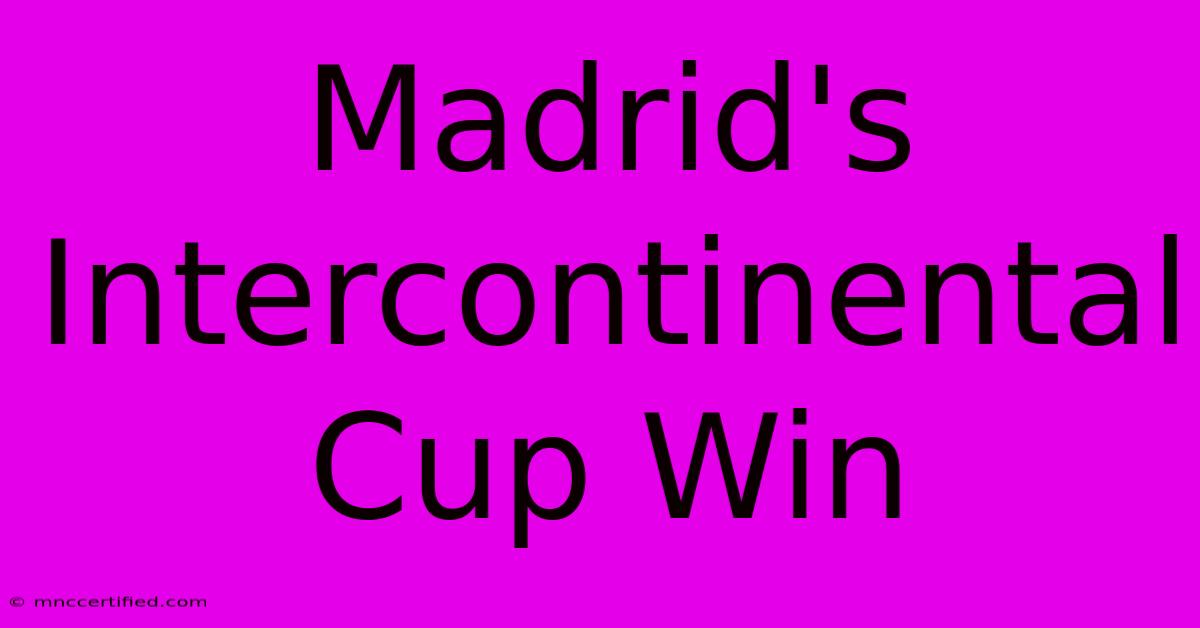Madrid's Intercontinental Cup Win

Table of Contents
Madrid's Intercontinental Cup Triumph: A Look Back at a Historic Victory
The Intercontinental Cup, a precursor to the modern FIFA Club World Cup, held a special significance in the world of football. For Real Madrid, their victory in the 1960 Intercontinental Cup stands as a monumental achievement, cementing their place among footballing giants. This article delves into the details of this historic win, exploring the context, the match itself, and the lasting impact it had on Real Madrid's legacy.
The Context: A Clash of Titans
The 1960 Intercontinental Cup pitted Real Madrid, the reigning European champions, against Peñarol of Uruguay, the winners of the Copa Libertadores. This match-up represented a clash of styles and footballing philosophies. Real Madrid, under the legendary Miguel Muñoz, boasted a star-studded lineup featuring the likes of Di Stéfano, Puskas, and Gento. Their attacking prowess was renowned throughout Europe. Peñarol, on the other hand, were a formidable side known for their grit, tactical discipline, and powerful attacking force. The stage was set for an unforgettable encounter.
The Stakes: More Than Just a Trophy
Winning the Intercontinental Cup wasn't simply about adding another trophy to the cabinet; it represented the pinnacle of club football achievement at the time. It was a chance to prove dominance on a global scale, showcasing supremacy against the best South American teams. For both Real Madrid and Peñarol, the stakes were incredibly high, representing the ultimate test of their capabilities. The pressure was immense, and the anticipation preceding the match was palpable.
The Match: A Thrilling Encounter
The two-legged tie was a rollercoaster of emotions. The first leg, played in Montevideo, saw Peñarol take a narrow 1-0 lead, setting the stage for a dramatic return leg in Madrid. The atmosphere at the Santiago Bernabéu was electric. The Madrid crowd, eager to witness their heroes claim victory, created an atmosphere of intense support.
A Comeback for the Ages
Despite the pressure and the away-goal deficit, Real Madrid displayed their characteristic resilience. In a thrilling match, they managed to overturn the deficit, securing a resounding 5-1 victory. The goals were a testament to the team's attacking prowess and the individual brilliance of their star players. Di Stéfano's leadership and Puskas's goal-scoring ability were instrumental in securing the victory. The performance cemented their status as a true global powerhouse.
The Legacy: A Defining Moment
Real Madrid's 1960 Intercontinental Cup victory holds a special place in the club's history. It marked a significant moment in their rise to global dominance, showcasing their ability to compete with and conquer the best teams from across the globe. This triumph contributed significantly to their reputation as one of the most successful clubs in football history.
Impact on Global Football
The victory also had a broader impact on the landscape of international club football. It highlighted the importance of the Intercontinental Cup as a truly global competition, showcasing the talent and competitiveness of both European and South American clubs. It laid the groundwork for the future FIFA Club World Cup, cementing the concept of a global club competition as a desirable and prestigious event.
Conclusion: A Timeless Triumph
Real Madrid's triumph in the 1960 Intercontinental Cup remains a testament to their enduring legacy. It's a story of overcoming adversity, showcasing individual brilliance within a cohesive team, and ultimately securing a victory that resonates even today. The match serves as a reminder of a time when the Intercontinental Cup represented the ultimate club football title, a fitting tribute to the greats who played in it. The victory’s importance goes beyond a mere trophy; it's a defining moment in Real Madrid's rich and storied history.

Thank you for visiting our website wich cover about Madrid's Intercontinental Cup Win. We hope the information provided has been useful to you. Feel free to contact us if you have any questions or need further assistance. See you next time and dont miss to bookmark.
Featured Posts
-
Bird Flu First Severe Human Case In The Us
Dec 19, 2024
-
De Chambeau Koepka Liv Vs Pga Showdown
Dec 19, 2024
-
Us Marshal Reeves Arkansas Honor
Dec 19, 2024
-
Dog Rescued Jordan Norths River Thames Heroism
Dec 19, 2024
-
Liv Golf Vs Pga Tour A Ryder Cup Clash
Dec 19, 2024